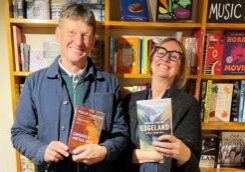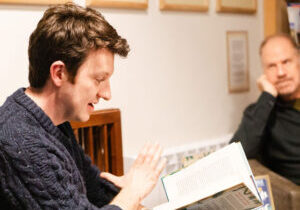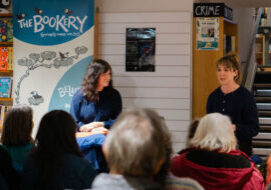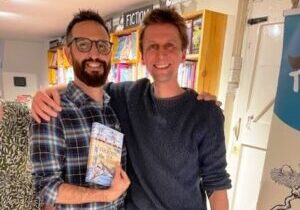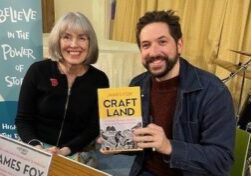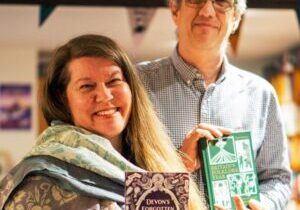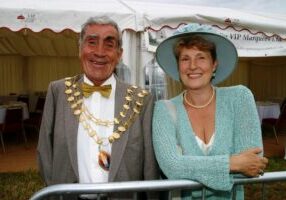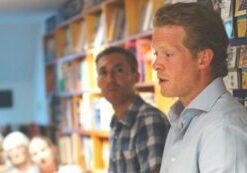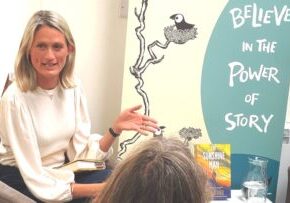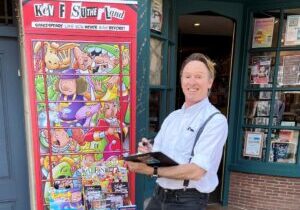FEATURES
A Full House, Wild Words, and the Future of the Land
May 27, 2025 | Blog > Features > A Full House, Wild Words, and the Future of the Land
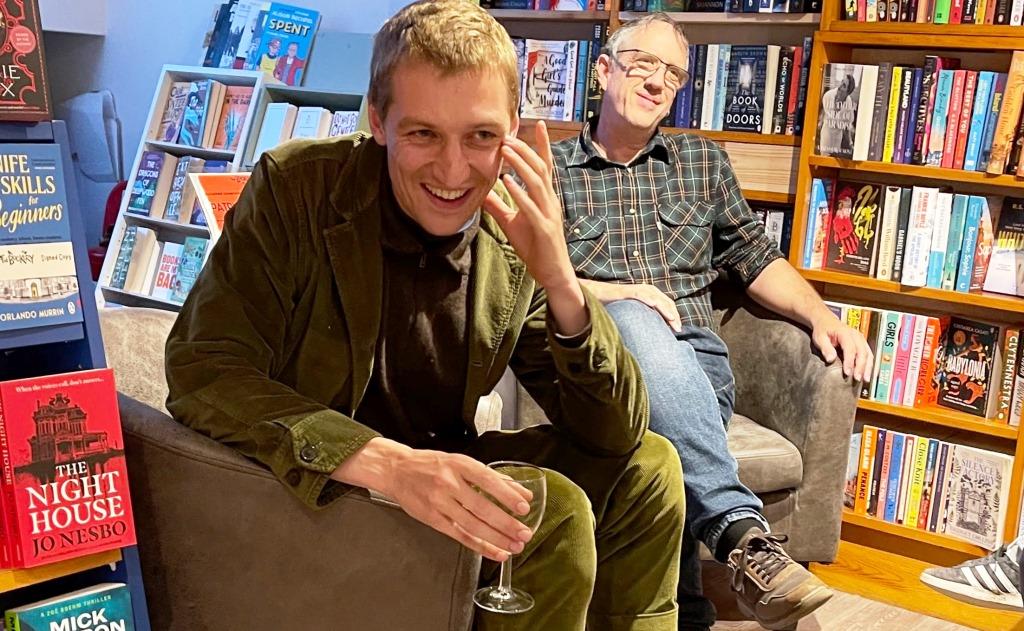
On a delightful spring evening at The Bookery, a packed house gathered to welcome conservationist, author, editor, and columnist Patrick Galbraith for a rich and vibrant conversation about land, access, and identity in the British countryside. Just 24 hours earlier, the High Court had ruled in favour of restoring the right to wild camp on Dartmoor — a landmark decision that resonated powerfully throughout the evening’s conversation. It was a timely and deeply thought-provoking event, full of insight, reflection, and moments of quiet intensity.
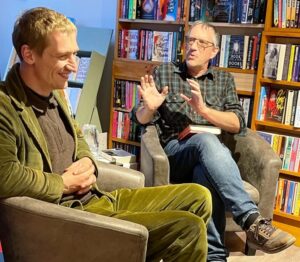 The event was chaired by Mark Norman, friend of the Bookery, folklorist and host of The Folklore Podcast. He opened the discussion by exploring what prompted Patrick to write his first book, One Last Song, a poignant journey through Britain’s fading traditions of birdsong and loss. From there, the discussion moved to Uncommon Ground, Patrick’s latest book — a searching, often surprising exploration of Britain’s countryside and the people who live, work, fight over, and love it. Patrick delves into some of the most urgent and uncomfortable questions about land in Britain: who owns it, who controls access to it, and what it means to be connected to place. He spoke compellingly about how land has historically been — and remains — a source of both sustenance and wealth, which inevitably brings dispute. He explored and challenged concepts such as the land being stolen from the people — and that debate over the rights of access and use of the land continues to shape our politics, our communities, and our sense of identity.
The event was chaired by Mark Norman, friend of the Bookery, folklorist and host of The Folklore Podcast. He opened the discussion by exploring what prompted Patrick to write his first book, One Last Song, a poignant journey through Britain’s fading traditions of birdsong and loss. From there, the discussion moved to Uncommon Ground, Patrick’s latest book — a searching, often surprising exploration of Britain’s countryside and the people who live, work, fight over, and love it. Patrick delves into some of the most urgent and uncomfortable questions about land in Britain: who owns it, who controls access to it, and what it means to be connected to place. He spoke compellingly about how land has historically been — and remains — a source of both sustenance and wealth, which inevitably brings dispute. He explored and challenged concepts such as the land being stolen from the people — and that debate over the rights of access and use of the land continues to shape our politics, our communities, and our sense of identity.
As Patrick pointed out, access to the land matters deeply — for reasons far beyond leisure. For some, the countryside is a playground; for others, it’s a livelihood. These contrasting relationships create tension, and as he stressed Patrick seeks to take a point of view, then challenge it. He gives voice to hill farmers, poachers, conservationists, landowners, foragers, and campaigners — rarely agreeing with any single perspective, but always listening closely. We also heard about his time talking with naturists and rather bizarrely a dropped towel incident in the breakfast room in his hotel that morning!
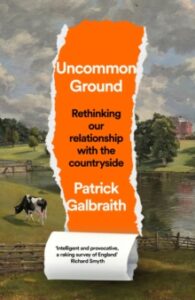 One of the evening’s most striking moments came when Patrick read from the Scotland chapter of Uncommon Ground, which recounts his time spent with poachers on the Isle of Lewis. The passage painted a vivid portrait of men who, while outside the law, hold a deep and generational knowledge of the land. Mark asked Patrick whether speaking to such a broad cross-section of people had changed his views. In response, Patrick shared that he enjoys seeking out the most challenging discussions that help shape his views. Throughout the evening he shared many fascinating insights such as from his discussions that during the 2001 Foot and Mouth outbreak in the UK, when access to much of the countryside was restricted, populations of insects and birds increased dramatically in some areas. It was a reminder, he said, of just how intense human pressure on the land has become. He noted that in 1500, there were 2.5 million people in the UK but this is now 70 million people and 40 million dogs so the way we relate to the countryside, he argued, cannot help but be transformed.
One of the evening’s most striking moments came when Patrick read from the Scotland chapter of Uncommon Ground, which recounts his time spent with poachers on the Isle of Lewis. The passage painted a vivid portrait of men who, while outside the law, hold a deep and generational knowledge of the land. Mark asked Patrick whether speaking to such a broad cross-section of people had changed his views. In response, Patrick shared that he enjoys seeking out the most challenging discussions that help shape his views. Throughout the evening he shared many fascinating insights such as from his discussions that during the 2001 Foot and Mouth outbreak in the UK, when access to much of the countryside was restricted, populations of insects and birds increased dramatically in some areas. It was a reminder, he said, of just how intense human pressure on the land has become. He noted that in 1500, there were 2.5 million people in the UK but this is now 70 million people and 40 million dogs so the way we relate to the countryside, he argued, cannot help but be transformed.
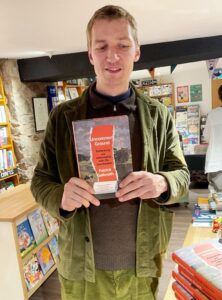 Naturally, much of the audience was keen to hear more about Patrick’s meeting with Alexander Darwall, the wealthy landowner at the centre of the Dartmoor case. Patrick shared his experience of that encounter and offered thoughtful analysis of what the High Court judgement could mean. In the follow up questions the audience was keen to know if this would it set a precedent? Could this be the start of a broader reconsideration of access rights in England? By the end of the evening, it was evident that Uncommon Ground had done more than impress — it had provoked. Patrick’s ability to navigate complex, often contentious issues around land, identity, and belonging with nuance and empathy sparked a rare kind of conversation: one that felt both grounded and expansive and a shared recognition that land is more than property: it is history, culture, and the foundation of our collective future.
Naturally, much of the audience was keen to hear more about Patrick’s meeting with Alexander Darwall, the wealthy landowner at the centre of the Dartmoor case. Patrick shared his experience of that encounter and offered thoughtful analysis of what the High Court judgement could mean. In the follow up questions the audience was keen to know if this would it set a precedent? Could this be the start of a broader reconsideration of access rights in England? By the end of the evening, it was evident that Uncommon Ground had done more than impress — it had provoked. Patrick’s ability to navigate complex, often contentious issues around land, identity, and belonging with nuance and empathy sparked a rare kind of conversation: one that felt both grounded and expansive and a shared recognition that land is more than property: it is history, culture, and the foundation of our collective future.
Thank you to everyone who joined us, to Mark Norman for his insightful hosting, and to Patrick Galbraith for reminding us that stories — like land — matter most when they are shared.
We have signed copies of Uncommon Ground available now at The Bookery or online HERE.
May 27, 2025
Blog > Features > A Full House, Wild Words, and the Future of the Land

